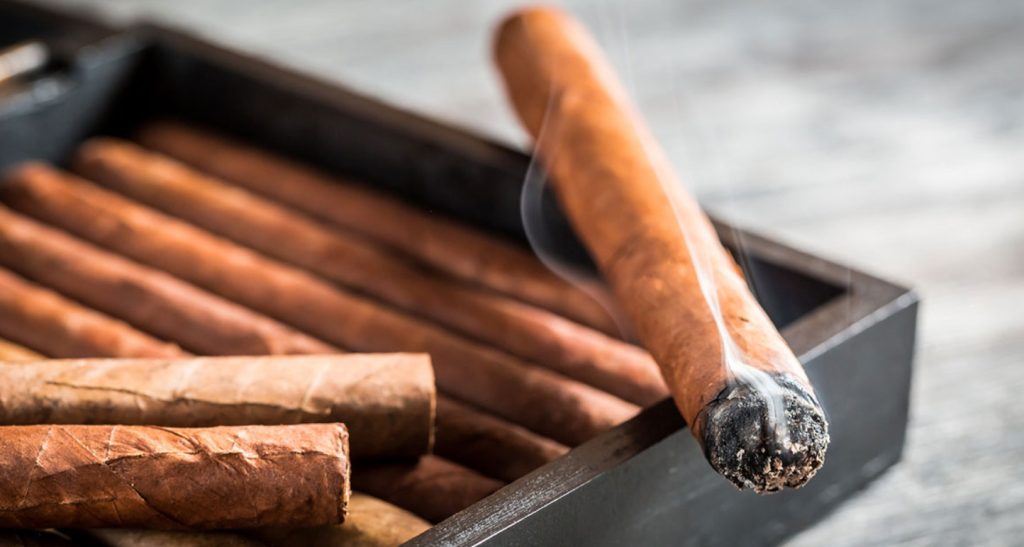Definition and Characteristics of Cigars
A cigar is a tightly rolled bundle of dried and fermented tobacco leaves that is typically smoked. Unlike cigarettes, cigars are not inhaled, but rather the smoke is drawn into the mouth and then blown out. Cigars come in a variety of shapes and sizes, with the most common being the parejo, which is a straight cylindrical shape, and the figurado, which includes any cigar that is not a parejo.
Cigars are typically made up of three parts: the filler, the binder, and the wrapper. The filler is a blend of tobacco leaves that give the cigar its flavor and strength. The binder is a leaf that holds the filler together, while the wrapper is the outermost leaf that gives the cigar its appearance and flavor.
The smoking of cigars has been a tradition for centuries, with origins dating back to the ancient Mayans and Aztecs. Today, cigars are enjoyed by people all over the world, with different countries producing their own unique blends and styles. Whether you are a seasoned cigar aficionado or just starting out, there is a cigar out there for everyone to enjoy.

Definition and Characteristics of Cigarettes
Cigarettes are a type of tobacco product that is widely consumed around the world. They are usually made of finely cut tobacco leaves wrapped in thin paper, with a filter at one end to reduce the inhalation of harmful substances. Cigarettes are typically smoked by lighting one end and inhaling the smoke through the mouth.
One of the main characteristics of cigarettes is their addictive nature. They contain nicotine, a highly addictive substance that can lead to physical dependence and withdrawal symptoms when trying to quit. This addiction is one of the reasons why cigarettes are so difficult to give up for many people.
Another characteristic of cigarettes is their harmful effects on health. Smoking cigarettes has been linked to a wide range of health problems, including lung cancer, heart disease, respiratory problems, and more. The harmful chemicals in cigarettes, such as tar and carbon monoxide, can cause serious damage to the body over time.
Composition and Ingredients in Cigars and Cigarettes
Cigars and cigarettes are two popular forms of tobacco products that have been enjoyed by people around the world for centuries. While both contain tobacco, they differ in terms of their composition and ingredients.
Cigars are typically made from a blend of different types of tobacco leaves, which are aged and fermented to develop their unique flavors and aromas. The leaves are then rolled into a cylindrical shape and wrapped in a tobacco leaf wrapper. Cigars come in a variety of sizes and shapes, from small cigarillos to large, hand-rolled cigars. The flavor of a cigar can be influenced by factors such as the type of tobacco used, the fermentation process, and the aging of the leaves.
On the other hand, cigarettes are made from finely cut tobacco leaves that are rolled in paper and usually contain additives such as preservatives, flavorings, and chemicals to enhance the taste and burn of the cigarette. The tobacco used in cigarettes is often processed with chemicals to increase nicotine levels and create a smoother smoke. Cigarettes are typically mass-produced and come in standardized sizes and packaging.
Overall, the composition and ingredients of cigars and cigarettes differ significantly, with cigars being made from natural tobacco leaves and cigarettes containing a mixture of tobacco and additives. Both products have their own unique characteristics and appeal to different groups of consumers.
Methods of Consumption: How to Smoke Cigars vs. Cigarettes
When it comes to smoking, there are two main methods of consumption: cigars and cigarettes. While both involve the inhalation of smoke, there are significant differences in how they are smoked and the effects they have on the body.
Cigars are typically larger and more complex in flavor than cigarettes. They are made from a single type of tobacco leaf, which is aged and fermented to develop unique flavors. Cigars are also hand-rolled, which can contribute to their higher cost. To smoke a cigar, you first need to cut the cap off the end to create an opening for smoking. Then, you light the cigar and puff on it slowly to enjoy the flavors.
In terms of health effects, both cigars and cigarettes pose risks to the smoker. However, cigars are typically smoked less frequently than cigarettes, which can reduce the overall health impact. Additionally, cigars are not typically inhaled into the lungs, which can decrease the risk of respiratory issues.
In conclusion, the methods of consumption for cigars and cigarettes differ in terms of size, flavor, and cost. Both have their own risks and benefits, so it is important for individuals to make informed choices about their smoking habits.
Health Risks Associated with Cigars and Cigarettes
Smoking cigars and cigarettes poses significant health risks that can have serious consequences on an individual’s well-being. Both tobacco products contain harmful chemicals and toxins that can lead to a variety of health issues, including lung cancer, heart disease, respiratory problems, and a weakened immune system. The smoke from cigars and cigarettes contains carcinogens that can damage the cells in the body, increasing the risk of developing cancer. In addition, the nicotine in tobacco products is highly addictive, making it difficult for individuals to quit smoking even when they are aware of the health risks.
Smoking cigars can be particularly harmful as they contain higher levels of nicotine and tar compared to cigarettes. The larger size of cigars means that smokers are exposed to more smoke and toxins, increasing their risk of developing health issues. Furthermore, cigars are often smoked for longer periods of time, allowing for more exposure to harmful chemicals.
Secondhand smoke from cigars and cigarettes can also pose health risks to individuals who are exposed to it. Non-smokers who are regularly exposed to secondhand smoke are at an increased risk of developing respiratory problems, heart disease, and even cancer. It is important for individuals to be aware of the health risks associated with smoking cigars and cigarettes and to take steps to protect themselves and those around them from the harmful effects of tobacco smoke. Quitting smoking and avoiding exposure to secondhand smoke are crucial steps in reducing the risk of developing serious health issues related to tobacco use.

Cultural Significance and Social Perception
Cultural significance and social perception play a crucial role in shaping our understanding of the world around us. Cultures are defined by their unique traditions, beliefs, and values, which influence how individuals interact with one another and perceive their surroundings. These cultural elements not only help us identify ourselves within a society but also contribute to a sense of belonging and unity among community members.
The cultural significance of certain practices, rituals, and symbols can also influence our social perceptions. For example, a religious ceremony may hold deep cultural significance for a particular group of people, shaping how they are perceived by those outside of their community. Similarly, the portrayal of certain groups in media and popular culture can impact how they are viewed and treated by society at large.
Cost Comparison: Cigars vs. Cigarettes
When it comes to smoking, there are two main options to choose from: cigars and cigarettes. While both provide a way to enjoy tobacco, there are significant differences in cost between the two.
Cigars are typically seen as a luxury item, with prices ranging from a few dollars to hundreds of dollars per cigar. This can make them a more expensive option compared to cigarettes, which are often sold in packs for a much lower price. However, it’s important to consider how many cigarettes are typically smoked in a day compared to how often a cigar is enjoyed.
Additionally, the quality of tobacco used in cigars is often higher than that found in cigarettes, which can impact both the taste and overall experience. Some smokers may be willing to pay more for the premium experience that comes with smoking a cigar.
Overall, the cost of smoking cigars versus cigarettes can vary greatly depending on individual preferences and habits. While cigars may initially seem more expensive, the value and enjoyment they provide may outweigh the price difference for some smokers. Ultimately, it’s important to consider both the financial and personal factors when deciding between cigars and cigarettes.

